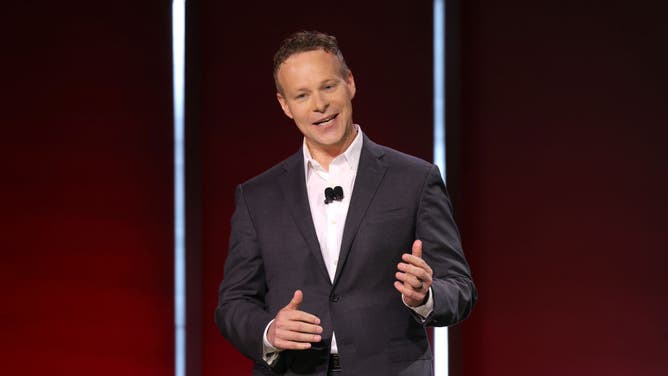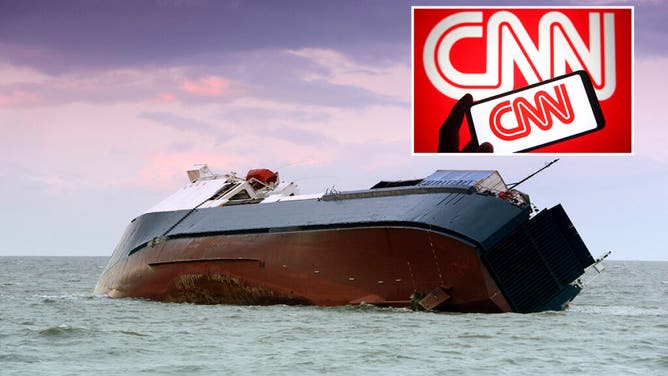Deck Stacked Against CNN's Future Following Chris Licht's Departure: Bobby Burack
For the second time in 18 months, CNN is left without a general. And a direction.
Warner Bros. Discovery tapped wunderkind producer Chris Licht as CEO of CNN 13 months ago. Licht succeeded Jeff Zucker, whom new ownership forced out by citing an improperly disclosed affair with a subordinate.
Wednesday, Discovery CEO David Zaslav informed staffers Licht would depart the company effective immediately.
The chapter of Licht does not read positively. Lineup reshuffles, internal leaks, viewership declines, talent firings, and damning profiles littered his short-lived reign.
As a Licht confidant put it to New York Magazine, Licht "was dealt a bad hand, and then he played it badly.”
Licht is out of cards. But the hand he was dealt remains at play.

NEW YORK, NEW YORK - MAY 17: Chris Licht, Chairman and CEO, CNN Worldwide, speaks onstage during the Warner Bros. Discovery Upfront 2023 at The Theater at Madison Square Garden on May 17, 2023 in New York City. (Photo by Kevin Mazur/Getty Images)
As we wrote in our instant reaction post, Licht inherited a diminishing product. Ratings were on a steady decline before his arrival. Conservatives had rightfully abandoned the network. Yet liberals rejected the less partisan edict that Licht’s bosses deployed him to install.
Those problems remain at large, plaguing the network. Simply elevating another fresh face as a leader will not suffice.
CNN is leaderless. But it's also directionless. And CNN must define the latter before the former.
CNN 1.0 was mostly a news network. It leaned left, but prioritized reporting and analyzing the news.
Under Zucker, CNN 2.0 could be best described as an MSNBC Lite. Zucker enabled Chris Cuomo, Don Lemon, Brian Stelter, and Brooke Baldwin to play opposition to Donald Trump and conservative media.
Zucker's CNN struggled to keep pace with Fox News and MSNBC, though it established an identity. CNN 2.0 abandoned half of the country and catered to the other.
A Pew Research study found that just 9 percent of CNN's election 2020 viewers were Republicans.
CNN 3.0 was less established. Remember, Licht was the mere enforcer of a grander vision that never fully developed.
It was influential shareholders John Malone and David Zaslav who formed the mission statement to shift CNN from the left toward the middle.
"I would like to see CNN evolve back to the kind of journalism that it started with, and actually have journalists, which would be unique and refreshing," said Malone ahead of the WarnerMedia and Discovery merger.
“ journalism first. America needs a news network where everybody can come and be heard; Republicans, Democrats,” said Zaslav.
But viewers met Malone and Zaslav's vision with rejection. The journalism-first pivot alienated more liberal viewers than conservative viewers it attracted.
In December, Licht spoke about attacks from the left for carrying out said vision
“The uninformed vitriol, especially from the left, has been stunning,” Licht told The New York Times. Which proves my point: so much of what passes for news is name-calling, half-truths, and desperation.”
In perhaps a further indication of a two-America culture, the much-maligned Trump town hall in May antagonizes both sides of the political aisle, citing the night as proof CNN holds a bias toward the other side.
One could argue CNN, if journalism is the priority, did its job in antagonizing both the right and the left. However, the lack of internal support the night levied upon Licht followed by record viewership lows since CNN didn't consider the night a win.

So, the question bears what is CNN? What is CNN 4.0? What demand in the market does CNN fill?
We won't provide answers to those questions because we don't know. Nor does CNN.
What we can say for certain is that the network must mitigate its roster limitations. In addition to finding a direction and leader, CNN needs to establish a roster of which viewers seek the opinions or expertises.
Licht installed Kaitlan Collins to be the face of the network, naming her the 9 p.m. host. Collins is talented. She's also 31 and doesn't command a room. At least not yet.
CNN is not equipped to fulfill any direction with its current lock room of personalities.
If news-first remains the edict, the network must employ actual journalists. So-called journalists like Oliver Darcy, Laura Coates, and Dana Bash are counterproductive to said mission.
If Discovery steers CNN backward leftward to appease viewers and staffers, it will need to find left-wing opinionists that viewers actually care about.
Brianna Keilar, Anderson Cooper, and Alisyn Camerota share opinions with Rachel Maddow. Yet they lack the flavor, skill, and gravitas that elevated Maddow near the top of cable news stardom.
It's not until deep down the list of media's most influential personalities does one find a host for CNN.
More media options exist than at any time in CNN's history. CNN is no longer the default news option. It's no longer where the stars reside.
CNN consists of a makeshift roster of toned-down partisans, hardly credible journalists, a few talented reporters, Zucker holdovers, painfully dull news anchors, and bewildered executives.
That's the hand CNN will deal Chris Licht's successor.